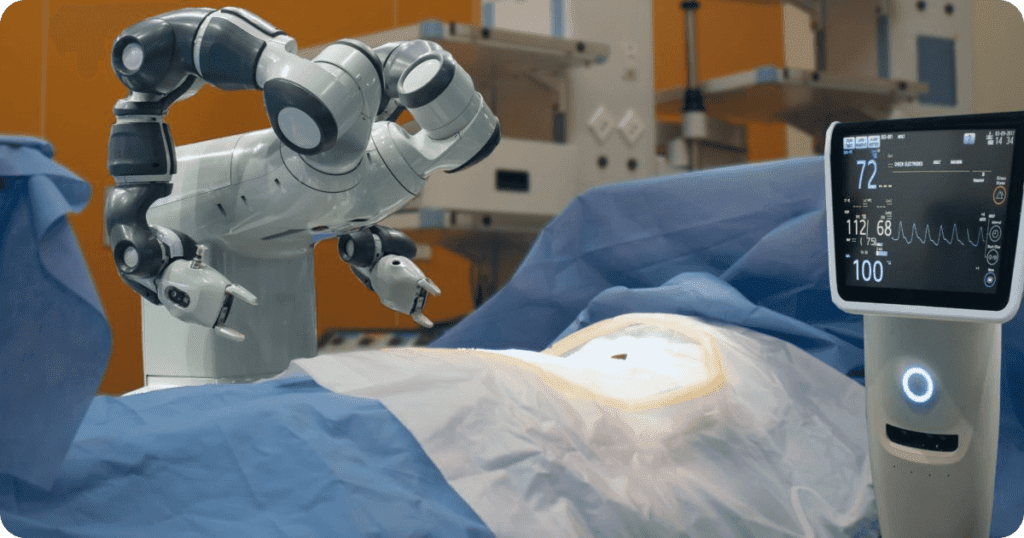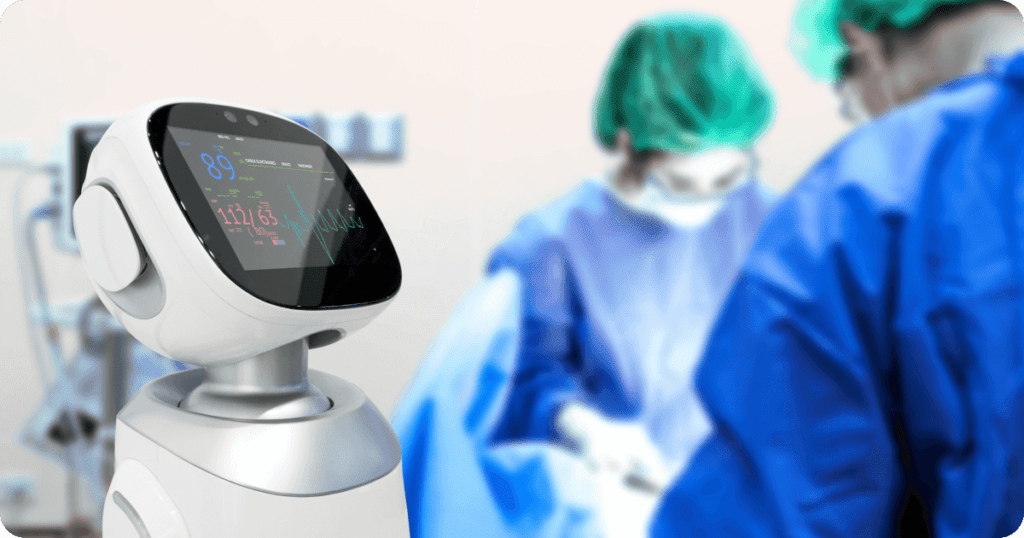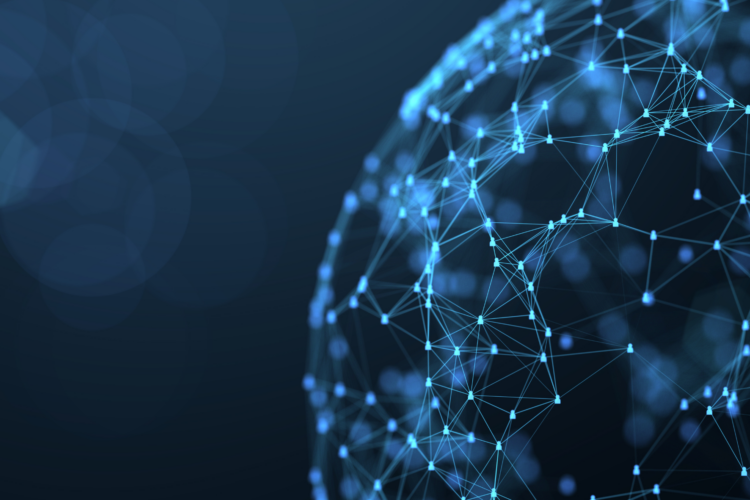It’s a good time to embrace technology in healthcare, but there’s still a lot to learn. Discover 5 benefits of AI in healthcare and 5 cons that we should address as soon as possible to unlock its full potential.
Like any other technology, the use of artificial intelligence (AI) in healthcare comes with both benefits and disadvantages. It’s true that tons of game-changers companies are investing in AI in healthcare research to streamline its presence in medical care institutions, I&D, and more. For instance, in 2020, Microsoft announced a $40 million five-year commitment to focus on healthcare concerns. Since it’s a kinda new technology in the healthcare world, we still have a lot to improve and learn from.
That’s why here we propose you explore the pros and cons of AI in healthcare. We’ll dive deep into 5 benefits of artificial intelligence in healthcare and 5 disadvantages to check out what points we should strengthen and the areas we can already harness.
5 benefits of artificial intelligence in healthcare
Artificial intelligence is being used in healthcare, for example, in medical imaging, electronic health records, and computed tomography scans. The possibilities for AI in healthcare seem to be endless. So let’s start with the good that artificial intelligence can do for healthcare.
1. Enhanced clinical decision-making
AI can empower healthcare providers with real-time, key data. That information can fuel decisions regarding patient diagnosis, plan treatments, and even help medical care teams manage population health. The Healthcare Information and Management System Society said that AI in healthcare has supported a transformation in healthcare decision-making thanks to the data it can provide and analyze.
Plus, AI can also be used in solutions to better harness insights in genomic, biomarker, and phenotype, and in tools specialized in radiology, pathology identification, and ophthalmology.
2. Boosted surgery assistant
Artificial intelligence in surgeries can be used in many different ways. For example, AI can give surgeons real-time knowledge about a patient’s status. It’s also a well-known fact that AI and robotics applications are rising in popularity thanks to successful testing and research. What’s the main reason why there’s so much interest in AI for surgeries? There are many reasons. For instance, AI smooths surgeries by helping surgeons reduce blood loss and the risk of side effects to also lend a hand to make patients’ recovery much faster.

3. Help healthcare teams focus just on what’s important
AI in healthcare can also help with appointment scheduling, translation of clinical details, patient history monitoring, patient tracking, and more. This means that AI can support healthcare providers leaving behind time-consuming mechanical tasks. Plus, it can also help in investigating, discovering, and correcting errors in claims before insurance companies deny reimbursement, translating clinical notes, and giving care recommendations.
4. Improved and faster detection of early disease risks
Thanks to the fact that AI can save all patient data in just one place, it can deliver key insights by looking at past and actual health issues. Healthcare providers can harness those insights and compare them to make better decisions and strengthen the diagnosis.
Plus, AI can be leveraged also to anticipate future health problems by analyzing symptoms, diagnoses, and specific cases. For instance, there’s a Google product called Verily that’s empowered to predict both communicable and hereditary genetic disorders.
5. Easier information sharing
Part of streamlining workflows and boosting precision in medicine is the role of AI in information sharing. We’ve kinda talked about this before, but it’s mainly the fact that AI can help healthcare providers track patient data more accurately and, therefore, strengthen patient care. Picture the potential of AI in this area with this example: doctors are able to rely on AI to identify patterns within patient data and check out how likely is that patient to get a certain disease. It’s with improved information sharing and analysis that healthcare institutions can unlock a more precise medicine.
5 disadvantages of artificial intelligence in healthcare
Despite all the benefits that this technology brings to healthcare, there’re still some disadvantages that we should be aware of. The cons aren’t meant to make us feel like AI isn’t a good choice but to work to reduce them and make an effort together with regulators, providers, developers, and all the actors involved to balance them.
1. Still needs a human eye to make sure it works well
Let’s begin with a known example: surgery robots. Although they’re extremely helpful, they work with logic instead of empathy so some behavioral insights can only be identified by health providers. The challenge isn’t to choose between technology or healthcare practitioners but to make tech experts and providers work together so AI has the human input and assessment it needs to work smoothly.
2. Choosing the right AI platform is challenging
We say it’s challenging for many reasons. One of them is that embracing an AI platform can be thought of as a path that leads to deployment in healthcare. This one drives another: healthcare institutions have to choose wisely how to implement AI, which means that they have to analyze and pick the right partner. Plus, it’s mandatory to embrace a platform that’s tailored to the organization’s needs and that has rigorous controls and accreditations.
3. It doesn’t take social variables into account
In healthcare, some plans, treatments, or recommendations can be attached to social, economic, and historical variables. So although AI is empowered to, for instance, suggest a treatment, it doesn’t take into account the fact that the patient might not be able to pay for it.
4. Risk is a concern
Security risks are still on tech experts’ and providers’ minds. Since AI works with data networks, security risks are something that can happen. Forrester Consulting said that 88% of security sector decision-makers think that AI is a growing concern. As the technology gets stronger, cyberattacks do too. They can even use AI to perform those attacks. That’s why it’s key to invest in policies and technologies that can help get ahead of risks and solve them smoothly.
5. AI can be wrong
As we said before, AI relies on diagnostic data collected from millions of instances. But if it doesn’t have enough data about certain illnesses, demographics, or environmental factors, misdiagnosis can easily happen. Solving data shortfalls is something that pulls AI to keep on evolving and improving.
Although these cons, it’s kinda a good time for technology in healthcare, there’s still a lot of potential waiting to be unlocked. And you might have questions that we didn’t address here, and that’s a good reason to continue discovering and learning from the power of technology in healthcare. You can easily do that in our blog.












